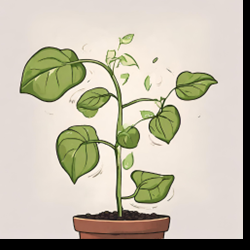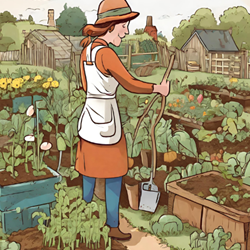Submitted by K.M. Dawson on Thu, 02/05/2024 - 14:38
HOPE AND EXPECTATION IN RESEARCH RELATIONSHIPS
Mollie Etheridge
Earlier this week my colleague gleefully announced her acquisition of a new bean plant, clarifying that she gardens with hope and not with expectation. Sitting down to write this blog, I found myself stuck on this distinction and its relevance to the project I’m currently working on, which concerns the role of professional expectations in researcher relationships.
My sense is that hope and expectation are two sides of the same coin. My colleague gardens with hope because, on some level, she expects that things might not work out. This is not dissimilar to the intertwinement of hope and expectation in the research space. When I, an enduring part-time PhD candidate and Research Assistant, tend to my research endeavours, I do so with hope for good outcomes, publications and – dare I say – the elusive permanent job. I don’t, however, expect that things will always work in my favour. Research is unpredictable, my internal imposter frequently impedes any growing confidence and contract precarity is so embedded in the experience of modern academic work that, if anything, I had actually expected this looming sense of dread with each turn of the calendar page.
Gardens and research are strange yet complementary bedfellows. Each thrive under controlled and care-full conditions. Further, to avoid any unnecessary losses, shortcomings and unruliness both growing plants and research decisions must be continually attended to. Yet the growing bud of research is not cared for by one individual. There are others working in the field. There are the ones who acquired the seeds, those who planted them, those who will propagate them and those who oversee not only patches of the plot but the entire allotment.
What do I expect of my fellow gardeners? The head gardener? And what do they expect of me? How will we – they – delegate up the tasks to ensure that neither the plants nor ourselves suffer in the turbulent process of growth? The answer seems simple: communicate. However, talking about our expectations is tricky, particularly in time-pressured fields where short-term goals take precedence over longer term planning. It is also challenging to talk about hope, a sentiment which teeters on the cliff edge of an emotional life that some regard as antithetical to the rationalistic requirements of research work.
Our study on professional expectations in research relationships is part of the University of Cambridge’s Action Research on Research Culture project. In the study we aim to explore how the (mis)alignment of professional expectations between postdocs and their supervisors/managers can affect collegiality, motivation, satisfaction, and overall well-being. When talking about expectations, we differentiate between those we hold knowingly and the ones which lie beneath the surface –those perhaps taken for granted notions that subtly guide our actions in seemingly automatic ways. We also distinguish between the expectations that we have of ourselves, others, the job we are currently doing and the wider political and economic structures that form the backdrop of academic practice today.
In our research, we want to know how these different expectations come together to inform our research behaviours and relationships, and, moreover, how we might use this understanding to facilitate more positive research experiences. To achieve this, we are inviting postdocs, early career academics and principal investigators at the University of Cambridge to make a submission to our ‘Your Voice’ survey or nominate their Principal Investigator/Research Group to the Research Culture Celebration on the basis of their contribution to positive research culture. Both forms of participation involve answering questions around expectation. However, those looking to make a Your Voice submission will also be asked to reflect on the emotional aspects of their research experience – maybe the things they hope for – by way of one of three creative prompts:
- Three things: Write three things you wish you knew before starting your current role AND Three things you are glad you knew when you started your current role;
- Describe the job role of either yourself or your PI or your postdoc;
- Write a letter to either your PI, your postdoc or your PhD self. The content of the letter is open, but we encourage participants to discuss how they feel about the job they are doing currently and research work more broadly.
While we anticipate, hope that this approach will shed light on the scope of expectations that researchers bring to the profession, we expect that hope will be a theme that ricochets throughout the submissions. We hope to read yours (anonymously) soon.
Those who make submissions will be compensated for their time with a lifestyle voucher up to the value £20.
To learn more about the study and start making your submission, please follow this link.
With thanks to Kate Murray and best wishes on her garden endeavours.



